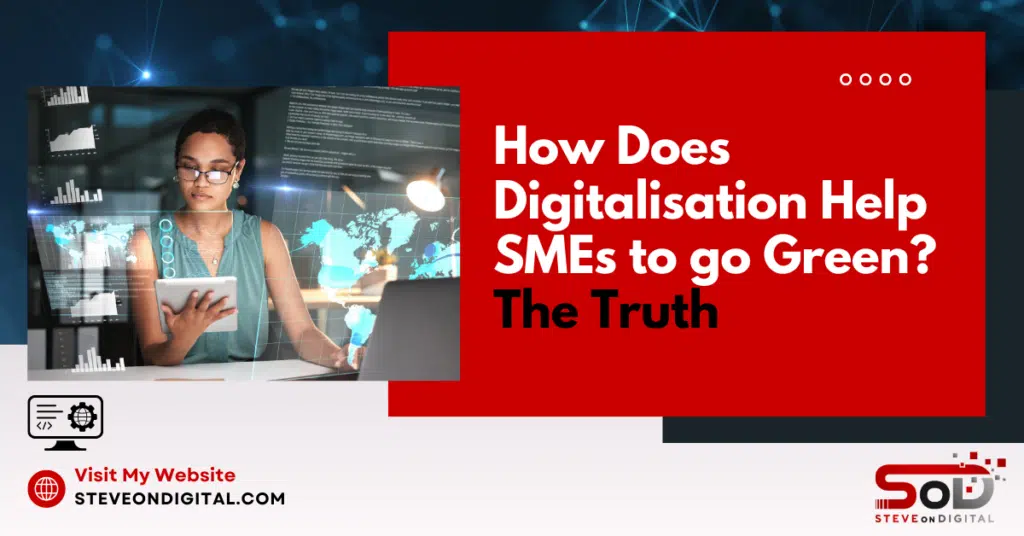How Does Digitalisation Help SMEs To Go Green? | The Truth

Digitalisation helps SMEs go green by increasing efficiency and reducing waste with AI and IoT. This is not just about operational excellence, it’s essential for sustainability in today’s eco conscious market. As the Digital Transformation Specialist I bring a mix of experience from my electrical engineering background, MBA and MSc in Project Management to help SMEs navigate the digital world. I help a million business owners and IT directors. I use real life examples to give practical advice. Beyond professional experience my personal life is about family, continuous learning and community engagement so I connect with entrepreneurs through various online and local platforms. Digitalisation and Green Transformation As someone who is in the digital world I’ve seen first hand the impact of digital technologies on small and medium enterprises (SMEs). This section looks at how digitalisation not only drives SMEs to operational excellence but also to a greener path, essential in today’s eco conscious market. Sustainable digital transformation is key to explaining how digitalisation helps SMEs go green, so their growth is innovative and environmentally friendly. What is Digital Transformation in SMEs Digital transformation in SMEs is integrating digital technology into every area of the business, fundamentally changing how you work and deliver value to customers. It’s not just about going from analog to digital; it’s about using these tools to make processes more efficient, sustainable and innovatively transform the business model to green innovation. As I’ve worked with many small businesses, going digital means big improvements in efficiency, sustainability and business model innovation. Why Green Initiatives Now The climate crisis is an urgent issue, SMEs need to go green through digitalisation to address the challenges and drive a transformation agenda. In my experience the pressure to be sustainable is growing. It’s not just about compliance; it’s a business imperative driven by customer demand and market trends. Digital tools are key here, to track and manage carbon footprint, energy usage and more. A recent study found that digital business transformation contributes to economic sustainability and can add significant social value to a business by going green (MDPI). Digital Technologies for Green SMEs It’s obvious digital technologies, especially AI are not just tools but catalysts that can trigger a big change in how SMEs approach sustainability, to reduce global CO2 emissions and cleaner production. Digital Tools And Technologies Through my work with many SMEs I’ve seen how technologies like AI, IoT and big data analytics are not just buzzwords, they are essential tools that drive big improvements in energy efficiency and waste reduction. These tools allow for energy usage monitoring and control, smart automation of energy hungry processes and better resource management all of which reduce environmental impact (MDPI). And the adoption of these digital tools and technologies is key to a sustainable digital economy, highlighting their role in green innovation and enterprise digital transformation. Real Life Examples And Case Studies I’ve seen SMEs in real life that have used digital technologies to improve their sustainability. For example a European study found that SMEs that implemented multiple digital technologies could improve their operational efficiency and environmental footprint (Transatlantic Leadership Network). These case studies are not only inspiring but also practical examples for other SMEs to go green through digital transformation. Energy Efficiency Through Innovation In my work with SteveOnDigital, I’ve seen how digital innovation can reduce energy usage and improve energy efficiency for SMEs. These are not just about cost savings, they are about a sustainable future. Smart Technologies Reducing Energy Usage One of the biggest changes I’ve implemented in SMEs is the integration of smart technologies. Smart meters and energy management systems are game changers. They provide real time data on energy usage so businesses can make informed decisions on energy usage. For example smart meters can identify peak usage times and shift energy use to off-peak, cheaper and lower carbon times. This saves money and reduces the load on the grid and overall carbon emissions. Technology Used Energy Consumption Before (kWh) Energy Consumption After (kWh) Percentage Reduction Smart Meters 10,000 7,000 30% Energy Management Systems 5,000 3,500 30% Automated HVAC Systems 8,000 5,600 30% Renewable Energy Solutions Digital systems are key to integrating renewable energy solutions into existing SME infrastructure. For example digital platforms can manage the variability of renewable energy sources like solar or wind by balancing them with energy demand in real time. This is key as it allows SMEs to reduce their reliance on fossil fuels and take control of their energy management. This is backed by studies that show digital technologies increase renewable energy adoption in SMEs (MDPI) (Transatlantic Leadership Network). Sustainable Business Models Digitalisation offers SMEs the chance to rethink and redesign their business models for sustainability. By integrating digital technologies companies can improve their production process and have more sustainable and efficient operations that contribute to environmental sustainability and better decision making. Circular Economy Digital is at the forefront of the circular economy. By using technologies like blockchain for better traceability or IoT for asset lifecycle management SMEs can improve their sustainability. These tools create a closed loop system where resources are reused and recycled and waste and environmental impact is minimized. My experience with small business owners is that those that adopt circular economy principles find new opportunities for innovation and cost savings. Production Process Re-engineering Production process re-engineering through digitalisation is another area where I’ve seen environmental and economic benefits. Digital tools give more control over production lines, reduce material waste and improve overall resource efficiency. For example AI can predict machine maintenance and prevent breakdowns and extend equipment life and reduce the environmental impact of manufacturing. Digitalisation And Supply Chain Sustainability In my work with SteveOnDigital I’ve worked with many small and medium-sized enterprises (SMEs) to transform their supply chains through digitalisation. This section will look at how digital technologies can streamline operations and sustainability within the supply chains of medium-sized enterprises and the key role of digitalisation in improving the performance and sustainability of SMEs in the global

